Phones with no chargers: Is it really about saving the planet?


Would you like your brand new smartphone to come with or without a charger? Is it really a zero-sum game, where you have to choose between saving the planet or ripping consumers off? This is one heated debate concerning new smartphones that are sold without a charger and to justify this, it claims that one does so simply to protect the environment. NextPit's comments section is positively burning with frank discussions going back and forth, and the same is happening among the editorial staff!
While unboxing the Samsung Galaxy S21 Ultra that Samsung has kindly sent to us for a review, my temper flared up for a while before I calmed down and smiled with relief, as my eyes were greeted by a USB-C cable in this box without any charger like I was used to all these years. Brands such as Apple, Samsung, and Xiaomi are no longer including chargers with their flagship devices, and by doing so, have they actually turned the tide by subtly brainwashing me into believing that it is all for the planet's good and done out of the companies' concern for the environment?
Have I been duped into being actually thankful to the degree where my tear ducts kicked in, and I am actually grateful that a manufacturer has, at the very least, "gifted" me a free cable so that I can connect my €1,000 smartphone to an existing charger?

"Oh, it's not such a bad thing after all," my German colleague Ben casually mentioned to me as my mind started to wander, going through all a roller-coaster of emotions sparked by this industry trend, which I still believe is nothing but a pure greenwashing exercise.
Instead of launching into yet another opinion piece and vigorously hammering out my vitriolic rage via my precious mechanical keyboard, Ben suggested, "Why not bring the debate to Slack?". Slack is our internal messaging tool used among the NextPit team, and it is obviously a platform that allows a far more productive exchange of ideas and opinions to further shape this article.
I took Ben's advice to heart and decided to defend my rather strong view on the absence of chargers as a greenwashing exercise, while Ben, in all of his honesty and without stepping into the role of being the devil's advocate, will be on the opposite end and offer his reasons that it is a good thing that has happened.
The entire purpose of having an opinion and propping it up with viable points is to demonstrate why "I" am right and "you" are wrong, I have inserted a poll after each round of this verbal joust - otherwise coined as a "Slack Fight" - that goes on between Ben and me. The camp that receives the most points will win this debate once and for all unless someone else comes up with a totally different viewpoint.
Debate 1: Smartphones without chargers: Is there a concrete, positive impact on the environment?
Ben: Whatever the real reasons are for manufacturers to justify the exclusion of chargers in their boxes, let us take a step back and pretend for a moment that their motives are clean and pure - that is, a sincere desire to save the environment. In the long run, it would actually be beneficial since doing so would automatically reduce the amount of electronic waste.
Samsung carried out a study on this topic during the launch of the Galaxy S21, and according to the South Korean manufacturer, removing the chargers that shipped with each Samsung Galaxy S21 would translate to nearly 29,000 tons of electronic waste saved annually. And that's only for a single company, imagine the compounded impact when it involves other manufacturers!
Antoine: Yes, but how many tons are they going to waste anyway by creating separate packaging and case-by-case shipments for the optional chargers now, huh? All the way from production, packaging, sales, logistics - everything used to be streamlined on a scale. With this new movement, it will be done on a per-unit basis. The effort to reduce the amount of waste does not only depend on what the company sells, but also on what consumers purchase. What is Samsung or Apple doing to discourage consumers from picking up new chargers as opposed to reusing their old ones? Nothing at all!
Ben: You are unable to know that until you give up chargers for good. However, I'm pretty sure that single-unit charger sales won't be as strong as you would like to think. It is as if we are unable to purchase new chargers at the moment, and all of the official stores carrying these chargers are out of stock, resulting in pent up demand. I imagine that sales of chargers will not skyrocket overnight, and that supply can be scaled accordingly to match demand. This is an issue that needs to be investigated and studied in the near long term.
Is the absence of chargers solely a marketing technique?
Antoine: If manufacturers sincerely wanted to save the planet and ensure consumers continued to make use of their old chargers, why do they always develop new proprietary charging technologies that will only function with a specific charger? Answer me, please.
Ben: That's a good question. I would venture that the demand for proprietary chargers is really a niche market. Seriously, who needs to charge their phone in just 10 minutes? This may very well be an extra feature for people who really, really need it but in reality, most of us do not. Similarly, when it comes to 5G connectivity, the technology is there just in case you would require it, but that will still take some years before 5G becomes widespread.
*Calm down Antoine, breathe. Be civilized. Inhale, exhale...
Antoine: Yeah, but we are paying for all of it in the first place. It is not as though smartphone manufacturers are merciful in this matter. "Oh, thank you so much for giving me access to 5G or high-speed charging, in the event that I ever need to use them." No, we actually forked out our hard-earned money for those features, and the manufacturers, in turn, sold those features (fast charging, 5G) to us by touting them as key selling points instead of optional extras.
Hence, my train of thought goes like this: By accepting the exclusion of the charger, we are indirectly making a basic function, i.e. a 60-, 90- or even 125-watt charger (theoretically speaking, such a charger is not commercially available just yet) an additional 'feature' that consumers will have to fork out additional money just to pick up a separate charger simply because the older one is unable to deliver such fast charging times. By right, it should be included with the new smartphone by default for free, considering the entire shebang comes as a set.
I'll even go one better: why not sell an extremely capable, fast-charging universal charger that will be compatible (via future firmware updates) with future changes and improvements made to charging technology in the coming years?
*Eureka! Now I've got it!
Ben: For starters, the longevity of a smartphone accessory does not equate to value-for-money. Most people are willing to pay more for products that are environmentally-friendly. This is obvious when you take look at other consumer products such as shampoos and household cleaning agents.
Wholesale stores have different pricing structures compared to supermarkets, but people prefer to fork out additional money to be more environmentally friendly, and who knows, these powerful chargers may one day become a reality!
It all boils down to a problem of licensing issues and different standards, but at the umpteenth attempt by the European Union to impose a universal charger upon smartphone manufacturers (your time is nearly up, Apple!), it could finally become a reality. In fact, I am somewhat using something similar at the moment!
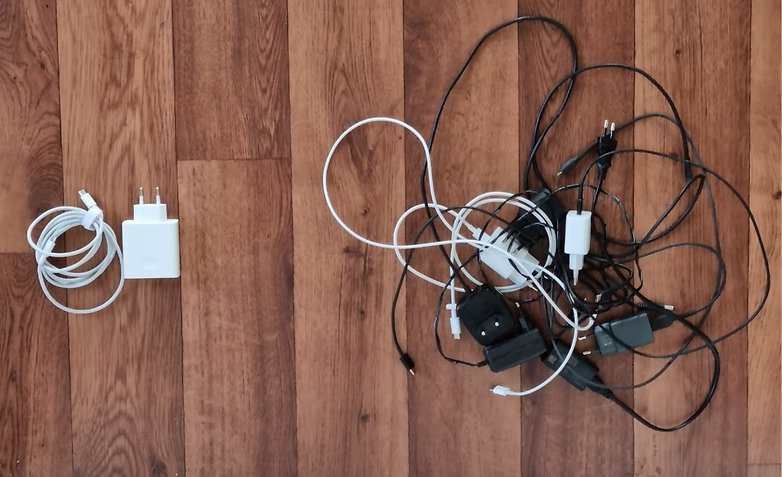
My single charger is powerful enough to quickly charge my Google Pixel 3 XL which is an ageing handset and is slow compared to other newer smartphones, but it also does charge the rest of my consumer electronic devices. Should the need arise for me need to juice up multiple devices, I can always use my laptop as an intermediary.
Saving the planet: Are customers more responsible than brands?
Antoine: Sustainability means recycling or even downcycling for users, but also making a product sustainable enough to remain relevant and competitive over the years for manufacturers. It is all about value-for-money.
Personally, if manufacturers want to continue promoting high charging speeds, it would be totally hypocritical on their part to pretend that deep down inside, that they do not want you to buy a new charger in order so that you can reap the benefits of selected technology.
Take the S-Pen for the Samsung Galaxy S21 Ultra for instance. It is not Bluetooth compatible for starters, and the worst thing is that the smartphone's software locks the Bluetooth functions, including the previous generation S-Pen that is Bluetooth compatible and is an indispensable part of the Galaxy Note 20 experience. All that Samsung has done is to make consumers look forward to picking up the upcoming S-Pen Pro that will retain the exclusive Bluetooth functions available on an older generation S-Pen.
The same logic applies to excluding chargers with new smartphones. If you want to really make your product more durable and discourage consumers from picking up additional accessories that they do not need, then why not ensure that consumers will be able to enjoy the full user experience on their smartphones in which they have already paid in full?
Take Apple for example. Why are they so adamant in rejecting the European idea of a universal charger? The answer is clear and simple - Cupertino simply wants to continue selling proprietary chargers at a high price to make a killing.
Ben: Oh no, you used the magical argument about the S-Pen! I agree many of the reasons put forward by manufacturers are hypocritical in nature, and there are certain practices that are nothing more but greenwashing.
However, from the viewpoint of a consumer who would like to do his/her bit for the environment, doing without a charger in a new smartphone purchase is a good thing. This trend has also started to pick up among different smartphone manufacturers despite the initial outcry, and it is also nice to see that chargers are taking on a more universal nature. (Again, we're looking at you, Apple).
Xiaomi has arrived at a good compromise by offering two options for their Xiaomi Mi 11 to their customers in China by providing them with options. You can pick up the Xiaomi Mi 11 with a charger inside the box, or one without - and the price will still remain the same. Needless to say, customers would "lose" money by picking up the latter as one would still pay the same amount of money, but if the consumer is really concerned about the environment, it is but a small price to pay. However, sales figures have shown that more people opted for the one with the charger included.
Antoine: It is far too much to ask consumers to receive the shorter end of the stick in order to prevent any future environmental disasters, without big tech doing their bit - especially when they are in a far more influential position to do so. This logic of making the buyer bear the costs of this environmental effort is simply unbearable.
Don't you think that manufacturers should do something in return? Such as reducing the price of their smartphones, for starters? If the goal is to save the planet and not to turn even more profit, why did Samsung reduce the price of the Galaxy S21 range while Apple left the price of the iPhone 12 untouched?
It literally costs a manufacturer nothing to exclude the charger. However, there is no upside for the consumer, who no doubt loses out in this transaction because of the exchange rate. Why is it so, where the consumer is the one to make the sacrifice? Is this a rather narrow view of sustainability, where the onus of responsibility is placed on the shoulders of the consumer, making it the best possible way to keep the planet safe from unwanted waste? I think not.
Ben: I agree that actions should be more than just business- and profit-driven when looking at the big picture, those are valid points that you have brought up. However, the bottom line is, I really don't think that technology companies would care that much, if at all.
Sustainability is all about image and/or sales. Apple doesn't use recycled aluminium because they think it's good for the planet, the reason is plain and simple: it is because more people are willing to buy a MacBook because it's cool to be eco-friendly.

The need for action lies in both policy and purchasing decisions. Laws need to be stricter while customers need to learn to flex their financial muscles through conscious purchase decisions.
At the end of the day, I do realize that I am not standing on solid ground since consumers should boycott products that hide behind greenwashing. This is one argument against me that I am happy to concede because it is such an important issue for the industry and for us as consumers - and for the future generations.
What do you think of this format? Journalists often debate among themselves, but these discussions rarely go beyond the private sphere of Slack. Would you be interested in more Slack Fights on possible divisive issues like this one? Let me know in the comments!






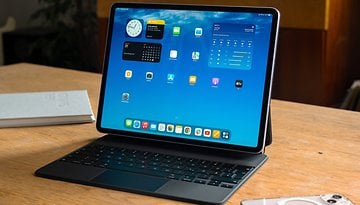

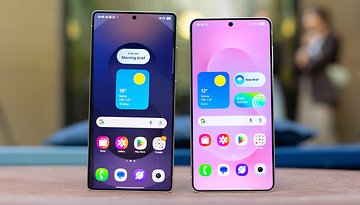
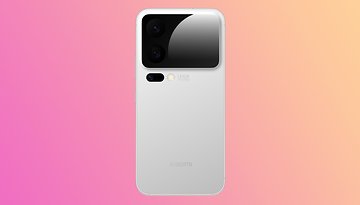

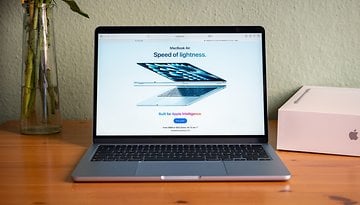



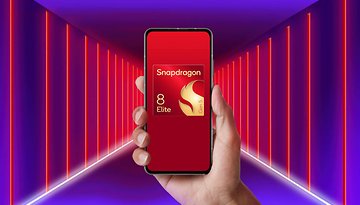
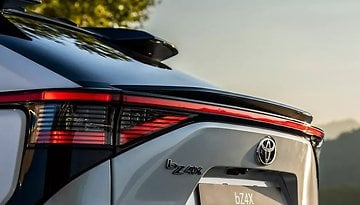
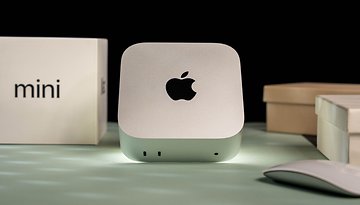


The assumption that you can just use your old charger is bogus. If you decide to be "environmentally friendly" and choose to sell or give away your old device to someone who has a use for it, then it would be safe to assume that they are going to no need the charger as well which means you no longer have a charger for your $800 +smartphone so now you have to fork out even more of your hard earned money to buy one that should have been included in the first place. This has nothing to do with the environment it has to do with sucking more money from consumers. If your new tv didn't come with a power cord, because you can use the one from your old TV, or the remote because they assume you have cable and can use the remote from the cable box,consumers would be furious,but yet phone makers seem to think this is acceptable. We as consumers need to stop this by boycotting these companies who want to rip off consumers, but they know they can get away with it because people will still buy the product anyway, because we are all stupid and accept less for more. I am one that will not accept this and will not be buying Samsung or any other brand that can't give me a charger, that I'm ready paying for.Lets hope we can stop this crap
It's probably about price and packaging savings. But those are contributory to less waste in their own right, even if not the prime motivator. But really, if what you're buying is not your first device, you don't need another charger. You have one you can re-use. And if your new device is USB C and your old device was microUSB, or even Apple's lightning abomination there are adapters for a dollar or two--still less cost and waste than buying a new charger. I use a USB C adapter on one of main charging cables and have for over 2 years now. I also carry adapters for micro-to-C and C-to-micro. smaller, lighter than a second cable and I can use any cable for any of my devices, or my family's devices, a few of which are sill micro USB.
So convergence on a standard and universality do serve less waste. And outside of first time buyers, you already have perfectly good wall warts. And if you're a first time buyer, you should buy a multi-port charger for the car and one for the home. Older multiport chargers can do bedroom overnight duty. Newer can live at your desk for speedy charging as you need it. There should be a downcycle of re-use of your chargers until they are ready to recycle. Before you recycle, there are number of charities that re-purpose phones and their support hardware for others in need. Keep them out of the waste stream as long as you can.
I have at least 5 single port chargers in my phone/tablet support box that I've never used from new. Motorola tended to wire the cable to the charger for their G model phones for a few years. Those went straight into this box and never got used at all because the design was too limiting.
This is an old thread but your comments are very specific to you and are not really that general. I have never thrown any charger I have received with a phone. Many times my phone has outlasted my phone so I need backups. In certain countries buying a good charger replacement is really hard. So having the good quality one that comes with the phone is essential. Also I have only thrown the phones I could not give away. And the ones I have thrown I have actually recycled.
In the past they would tell you to only use the charger that came with the phone. Now all of the sudden that is not important.
The chargers break for many different reasons while the phone can still work. So I have actually had more working phones at times than chargers. Now that they don't include the charger it only means in certain countries people will have a much harder time getting the accessories that should have come with the phone. And if you buy the charger it is a lot of packaging waste. No people I know throws a perfectly working charger. If they already have another they just save it for later or give it away. Why would you throw away something that is brand new and working? People throwing things that work are going to still do it with other things. This is not in any way a measure for the environment. They only care about each day reaping more money out of people.
If they cared about the environment they would allow you to easily change the battery. I have had several phones die on me because of the battery and now they are just pretty paper weights. I guess in those cases the environment is really not important.